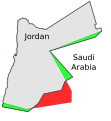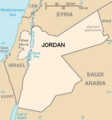Portal:Jordan
The Jordan Portal  Jordan, officially the Hashemite Kingdom of Jordan, is a country in the Southern Levant region of West Asia. Jordan is bordered by Syria to the north, Iraq to the east, Saudi Arabia to the south, and Israel and the occupied Palestinian territories to the west. The Jordan River, flowing into the Dead Sea, is located along the country's western border. Jordan also has a small coastline along the Red Sea in its southwest, separated by the Gulf of Aqaba from Egypt. Amman is the country's capital and largest city, as well as the most populous city in the Levant. Modern-day Jordan has been inhabited by humans since the Paleolithic period. Three kingdoms emerged in Transjordan at the end of the Bronze Age: Ammon, Moab and Edom. In the third century BC, the Arab Nabataeans established their kingdom centered in Petra. Later rulers of the Transjordan region include the Assyrian, Babylonian, Roman, Byzantine, Rashidun, Umayyad, Abbasid, and the Ottoman empires. After the 1916 Great Arab Revolt against the Ottomans during World War I, the Greater Syria region was partitioned, leading to the establishment of the Emirate of Transjordan in 1921, which became a British protectorate. In 1946, the country gained independence and became officially known as the Hashemite Kingdom of Jordan. The country captured and annexed the West Bank during the 1948 Arab–Israeli War until it was occupied by Israel in 1967. Jordan renounced its claim to the territory to the Palestinians in 1988, and signed a peace treaty with Israel in 1994. Jordan is a semi-arid country, covering an area of 89,342 km2 (34,495 sq mi), with a population of 11.5 million, making it the eleventh-most populous Arab country. The dominant majority, or around 95% of the country's population, is Sunni Muslim, with the rest being mostly Arab Christian. Jordan was mostly unscathed by the violence that swept the region following the Arab Spring in 2010. From as early as 1948, Jordan has accepted refugees from multiple neighbouring countries in conflict. An estimated 2.1 million Palestinian refugees, most of whom hold Jordanian citizenship, as well as 1.4 million Syrian refugees, were residing in Jordan as of 2015. The kingdom is also a refuge for thousands of Christian Iraqis fleeing persecution. While Jordan continues to accept refugees, the large Syrian influx during the 2010s has placed substantial strain on national resources and infrastructure. The sovereign state is a constitutional monarchy, but the king holds wide executive and legislative powers. Jordan is a founding member of the Arab League and the Organisation of Islamic Co-operation. The country has a high Human Development Index, ranking 99th, and is considered a lower middle income economy. The Jordanian economy, one of the smallest economies in the region, is attractive to foreign investors based upon a skilled workforce. The country is a major tourist destination, also attracting medical tourism due to its well developed health sector. Nonetheless, a lack of natural resources, large flow of refugees, and regional turmoil have hampered economic growth. (Full article...) Selected article -The COVID-19 pandemic in Jordan was a part of the worldwide pandemic of coronavirus disease 2019 (COVID-19) caused by severe acute respiratory syndrome coronavirus 2 (SARS-CoV-2). On 2 March 2020, the Ministry of Health confirmed the first case in Jordan. As soon as reports about a novel coronavirus in China emerged in early 2020, Jordan's National Epidemics Committee and Health Ministry on 26 January designated certain hospitals to treat infections and established several protocols to deal with the arrival of the coronavirus to the country, five weeks before the country recorded its first case on 2 March. Despite the fact that Jordan had only one confirmed coronavirus case on 14 March, the government suspended schools, banned public gatherings and closed the borders and airports in response to the rapid spread of the virus in countries surrounding Jordan and around the world. On the morning of 15 March, the government implemented a plan to quarantine arrivals in the country before the borders and the airport were completely shut down on 17 March. The Jordanian Army was tasked with the plan's implementation as it moved to facilitate the transportation of 5,000 arrivals from airports and border crossings to luxury Dead Sea resorts, a popular tourist area which was declared a closed military zone and used as accommodation for a mandatory two-week quarantine paid by the government. (Full article...)Selected biography -Marouf Suleiman al-Bakhit (Arabic: معروف البخيت; 18 March 1947 – 7 October 2023) was a Jordanian politician who was twice prime minister. He first served as prime minister from 27 November 2005 until 25 November 2007 and then again from 9 February 2011 to 17 October 2011. Bakhit also held the position of Jordanian ambassador to Israel and the national security chief. Appointed prime minister by King Abdullah II less than three weeks after the 2005 Amman bombings, Bakhit's main priorities were to maintain security and stability in Jordan. He was reappointed prime minister by the King on 1 February 2011, following weeks of protests. Al-Bakhit resigned from his post on 17 October 2011, and was succeeded by Awn Shawkat Al-Khasawneh on 24 October. (Full article...)WikiProjectFor editor resources and to collaborate with other editors on improving Wikipedia's Jordan-related articles, see WikiProject Jordan. General images -The following are images from various Jordan-related articles on Wikipedia.
Selected city -
Russeifa (Arabic: الرصيفة, also spelled Ruseifa(h), Rusaifa(h), Russiefa, etc., also with peceding article el-, al-, er- or ar-) is a city in Zarqa Governorate in Jordan. It had a population of 472,604 inhabitants in 2015, making it the fourth-largest city in Jordan, after Amman, Irbid, and Zarqa. (Full article...)
See also: List of cities in Jordan
Related portalsReligions in Jordan Arab states Other countries Recognized content
Featured articlesGood articles
TopicsSelected topic overview -
CategoriesSelected picture -Amman, the capital of Jordan at nighttime. Amman was named one of the MENA's best cities according to economic, labour, environmental, and socio-cultural factors. It is a major tourist destination in the region and the capital is especially popular among Gulf tourists. Amman is considered one of the richest and most Western-oriented cities in the Middle East.
Associated WikimediaThe following Wikimedia Foundation sister projects provide more on this subject:
SourcesDiscover Wikipedia using portals |


































































